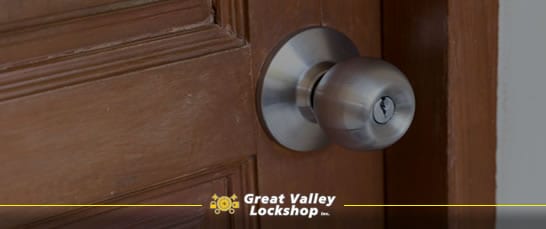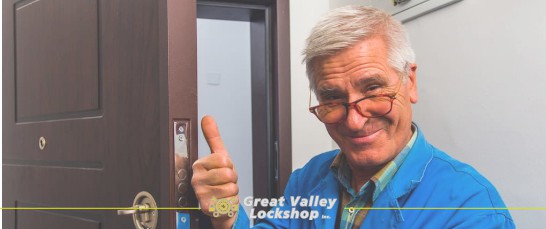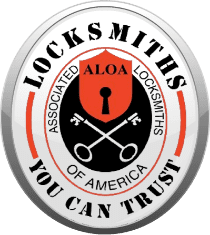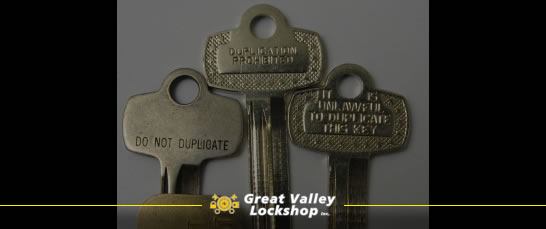
Will a Locksmith Copy a Do Not Duplicate Key?
The truth is there’s no law regarding “do not duplicate” keys. The engraved message found on many business keys is not legally binding – it’s just a recommendation. Though many chain hardware stores, such as Ace, may refuse to cut a copy of these keys, a locksmith can easily duplicate them.
Now, you’re probably wondering, ‘Why are some keys marked “do not duplicate”?’ and, ‘If a locksmith can copy them, are they any more secure than non-marked keys?’
This article will answer all your questions revolving around this type of key and how you can improve your security system.
Key Takeaways:
- A locksmith or hardware store can duplicate a ‘Do Not Duplicate’ key. There is no law prohibiting them from doing so.
- A “Do Not Duplicate” key offers a false sense of security to owners. They do not add any layer of security, as they can easily be duplicated.
- Great Valley Lockshop is an expert business that deals with everything from keys to locks. Contact us to get your security system evaluated and improved!
Will a Locksmith Copy a “Do Not Duplicate” Key?
The short answer is yes; a locksmith can copy a key that says “Do not duplicate.” As long as they have the key blank, they can most likely duplicate the key for you.
The inscription is basically just a warning sign but is not protected by any legally binding law. However, big hardware stores may refuse to duplicate the key marked do not duplicate.
According to the Associated Locksmiths of America (ALOA), having a “do not duplicate” message inscribed on your company keys may actually provide a false sense of security. Because keys labeled “Do Not Duplicate” can actually be copied, your business will need real solutions to increase security successfully.
Property owners and managers began pressing the “do not duplicate” key message in an attempt to control security violations from terminated employees, former tenants, construction workers, and others who gain possession of a key. Unauthorized key duplication remains a serious threat to security today and is currently the single most violated security policy in business.
The inscription may decrease the number of copies in circulation because of the need to have them copied by a locksmith. Yet the fact remains that keys stamped with “Do Not Duplicate” are no more secure than keys without it.
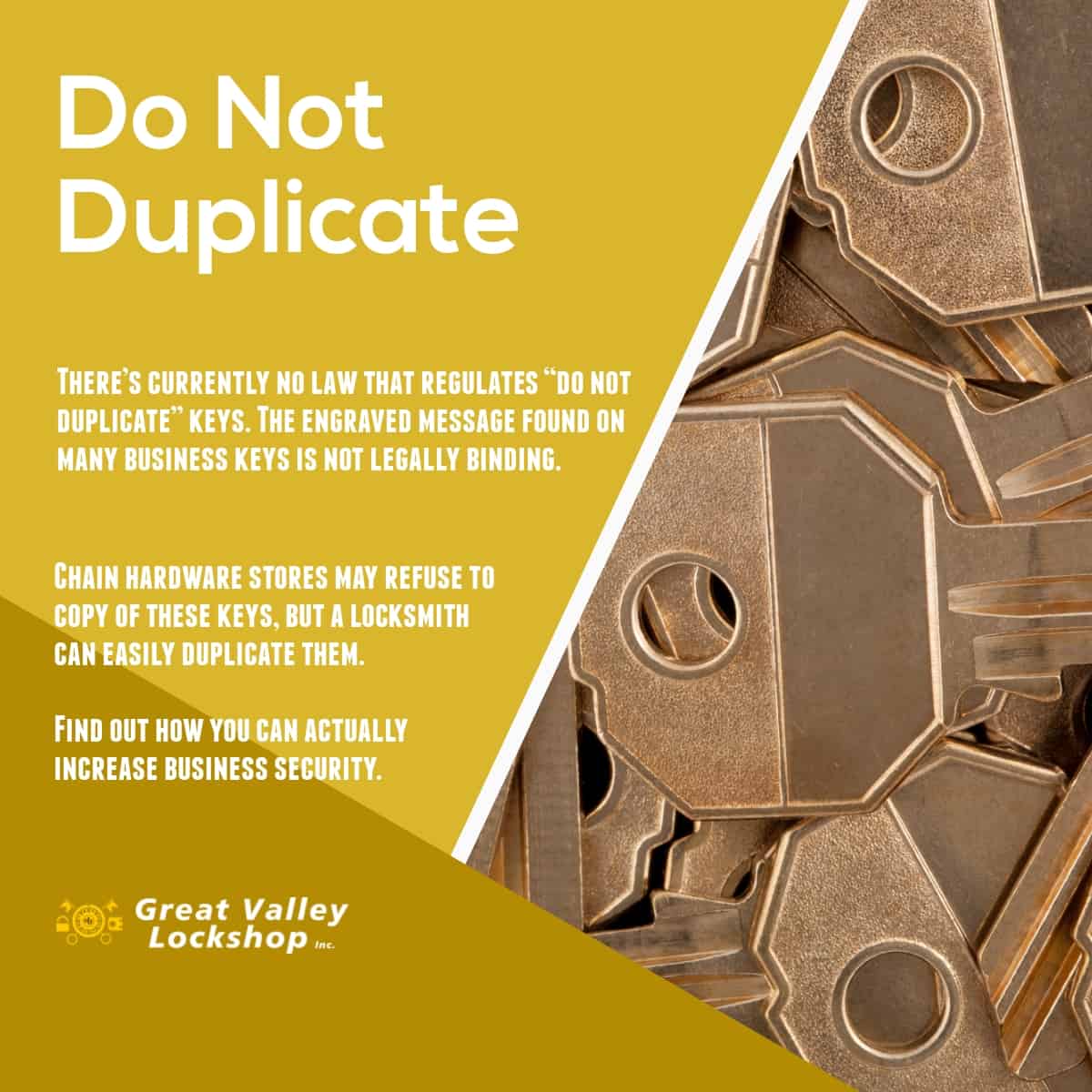
For “Do Not Duplicate” Keys, The Associated Locksmiths of America Advises:
The Associated Locksmiths of America (ALOA) says,
“Orders for keys stamped ‘Do Not Duplicate’ or similar wording will be handled in the same manner as any unrestricted key. ALOA members should inform the consumer that the use of keys stamped ‘Do Not Duplicate’ or similar wording is not effective security and further that the use of such words is deceptive because it provides a false sense of security. Consumers who desire effective security should purchase a patented key control system rather than rely on a ‘Do Not Duplicate’ marking. This does not apply to keys protected by law.”
The good news is that some other types of keys are available that can help ensure the security of your business. Keys, such as a transponder key, offer more security than one inscribed with a do not duplicate marking.
Where Can I Get a Do Not Duplicate Key Made?
You can get a “do not duplicate” key made by a locksmith shop or a local hardware store. Any store that offers cutting and engraving services can do this for you.
It is important to note that while some shops will not duplicate a key like this for ethical considerations, it does not add any security to your property. Any locksmith shop can duplicate these keys as no law governs the inscription.
Which Keys Cannot Be Copied?
Keys with high-security features, those that are difficult to replicate, typically cannot be copied. This is either because they require a piece of advanced equipment to be copied or because it is patented by the manufacturer.
These keys often have unique designs or embedded technologies that make duplication difficult without the proper permissions and equipment. Examples include:
- Transponder keys. This type of key is embedded with a computer chip that sends an encrypted code to prevent duplication. This key is often used for vehicles.
- Four-sided keys. Otherwise known as double-sided, these keys have a set of four teeth, which makes it harder to duplicate and the lock to pick.
- Post Office box keys. The US Postal Service provides these keys for every post box installed. They legally cannot be duplicated without authorization.
- Vehicle Anti-Theft System (VATS) keys. These keys are designed with electronically installed resistors, which makes them work only for a particular vehicle.
- Keys marked with “US Property.” These are government-issued keys and cannot be duplicated.
- Master keys. Master keys, which are designed to open multiple locks within a specific system, are usually controlled tightly by the organization that owns the system. Duplicating these keys without proper authorization is typically prohibited.
Put simply, keys that require special techniques and equipment are harder and more unlikely to be duplicated.
Are you in need of a high-security lock and key system? Great Valley Lockshop specializes in installing security systems for residential and commercial properties. Contact us today and know your options!
What Are Restricted Keys?
Restricted keys are covered by U.S. patent laws, which protect manufacturers of specialized lock and key systems. There can be a penalty of up to $10,000 imparted for circumventing the law, including the illegal duplication of a restricted key.
In order to make some of their products more secure, lock makers have made restricted keys that are harder to copy because the process requires special equipment, and the key design is patent-protected.
Duplication of restricted keys is limited to approved manufacturers and locksmiths and requires the use of particular tools. In order to have a copy made, the locksmith should ask for the identification of the person requesting it and proof that this person has obtained permission from the original owner.
What Are Unrestricted Keys?
Unrestricted keys are standard keys that lack any restrictions on duplication. They are commonly used for basic residential and commercial applications, such as home locks and office doors.
These keys are readily available at hardware stores, locksmiths, and online retailers, making them convenient and widely accessible. Due to their ease of duplication and widespread availability, unrestricted keys are often used in situations where high security is not a primary concern, offering a balance between convenience and affordability for everyday locking needs.
What Are the Differences Between Restricted, Unrestricted, and Do Not Duplicate Keys?
The most critical difference among these types of keys is their duplicability. That means some of them can be duplicated, whereas some cannot be, and others can be duplicated but require authorization.
Here is a summary of their differences in application:
| Factor | Restricted Keys | Unrestricted Keys | Do Not Duplicate Keys |
| Distribution | Distributed with limitations and often require authorization. | Freely distributed without limitations. | Distributed with a stipulation not to make duplicates. |
| Access Control | Typically grants access to sensitive or restricted areas. | Grants access to common or public areas. | Grants access to areas with security concerns or specialized equipment. |
| Security | Generally higher level of security due to restricted access. | Lower level of security due to widespread distribution. | Moderate level of security to prevent unauthorized duplication. |
| Authorization | Requires authorization or approval for distribution and use. | No specific authorization required for distribution. | Distributed with a stipulation to prevent unauthorized duplication. |
| Duplication | Typically controlled to prevent unauthorized duplication. | Can be duplicated freely without restrictions. | Stipulation not to make duplicates; but generally can be duplicated. |
| Cost | Often higher cost due to restricted distribution and control. | Lower cost due to widespread availability. | May have higher initial cost due to specialized manufacturing. |
| Use of Key | Government facilities, high-security buildings, confidential areas. | Residential buildings, public spaces, commercial properties. | Laboratories, specialized equipment, secure storage facilities. |
Best Methods to Increase Business Security
Now that you know why unrestricted keys with “do not duplicate” inscriptions do not offer legitimate security measures, you need the right strategy to boost security.
The best way to increase business security is to install a comprehensive security system by a professional locksmith like Great Valley Lockshop.
Here is a list of other strategies that you can use to increase business security.
- Get a professional locksmith to do the job. If you suspect that duplicate keys are undermining your organization’s security, consider asking a qualified locksmith to rekey the locks on the property. During rekeying, the locksmith changes the internal mechanism that accepts the keys, making it impossible for the previous keys to work and open the lock.
- Invest in high-security lock and key systems. Another way to provide extra protection for a commercial property is to invest in locks that are more difficult to pick. Some manufacturers produce locks with tight tolerances, additional pins, or special features on the pins – including dimples and angles. Locks should also be made of high-strength materials to prevent burglars or vandals from drilling or breaking them with force. Check with the manufacturer if you are unsure of what your locks are made of or how they are designed.
- Discover smart electronic options. For superior security, it’s recommended that a technological solution, such as smart electronic locks, be implemented. These special devices allow you to lock and unlock doors, program the security system, and even monitor traffic in and out of the building – all from your smartphone. Another great option is electronic access control systems; key card systems allow businesses to restrict certain areas or terminate access to some without needing to reissue cards for other employees.
Great Valley Lockshop Can Help Replace the Need for a Duplication Prohibited Key
Your local locksmith can duplicate all types of keys and make key copies that work perfectly. A skilled locksmith can also provide you with the information, locks, and keys to safeguard your commercial property from unwanted intruders.
Keys are just one layer of a comprehensive security system. You also need to consider the locks and other features to keep your property safe.
Great Valley Lockshop can help. Our team of expert locksmiths and craftsmen can help you evaluate your property’s needs, suggest the best security solution, and install it for you efficiently. Get the best and most advanced security solutions to protect your business and property today.
For service, contact us at (484) 324-2986 or fill out our online request a quote form. Ask us about “Do not duplicate” keys, restricted keys, and electronic security systems to protect your business.
FAQs
Are “do not copy” keys more secure than no-marked keys?
“Do not copy” keys offer a slight advantage over no-marked keys. However, this level of advantage is not enough to give you the sense of security you need, as these keys can be copied without legal sanctions.
Are there keys that cannot be duplicated?
Yes, there are keys that cannot be duplicated, such as high-security keys with complex designs or electronic components. These keys often require specialized equipment and authorization for duplication.
Why do some keys say not to duplicate?
Keys are marked “do not duplicate” to discourage unauthorized replication and maintain control over access to specific areas or properties. This warning serves as a deterrent and a reminder of key duplication’s legal or ethical responsibilities.
Can restricted keys be copied?
Restricted keys cannot be copied without proper authorization and specialized equipment.
Why can’t some keys be copied?
Keys that incorporate high-security features or electronic components typically cannot be copied due to their specialized design and technology.
What does restricted mean on a key?
“Restricted” on a key signifies that it cannot be duplicated without explicit permission from the key’s issuer, usually to maintain security or control access to specific areas.
